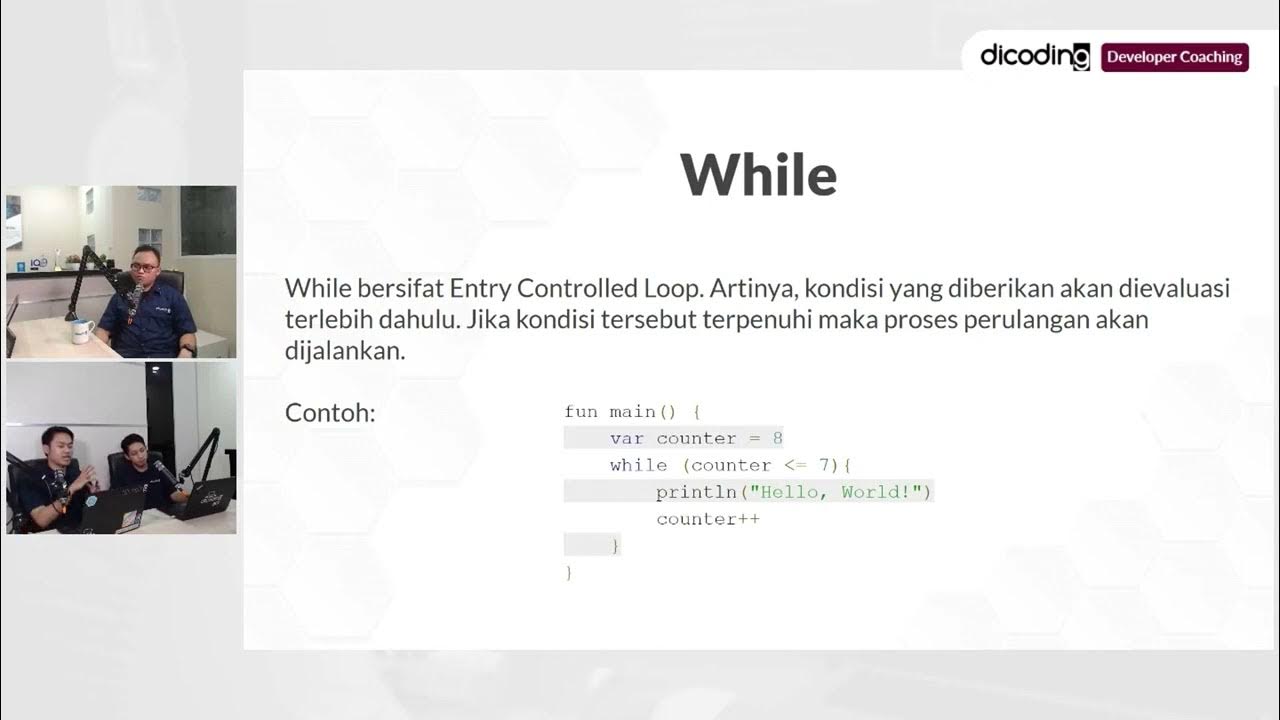Dicoding Developer Coaching #19: Android | Menyimpan Database Secara Local di Aplikasi Androidmu
Summary
TLDRIn this video, Krisna from Dicoding Indonesia explains the importance of code reviews for Android developers. He highlights how tasks and projects submitted to Dicoding Academy are reviewed by experienced developers who provide valuable feedback. The session covers various topics including the types of projects reviewed, the benefits of code reviews, and the significance of local databases in Android development. Additionally, there is a discussion on database management and the use of SQLite in Android apps. The video concludes with a Q&A session addressing common questions from the audience and a giveaway announcement for participants.
Takeaways
- 👋 Introduction: Krisna, a code reviewer from Dicoding Indonesia, explains the purpose and process of code reviews at Dicoding.
- 🔍 Code Review Process: Every task submitted to Dicoding Academy is reviewed by expert developers who provide feedback in English.
- 👨💻 Expert Reviewers: Dicoding has many professional reviewers from various backgrounds, including head developers and award-winning technology experts.
- 📚 Types of Submissions: Dicoding Academy projects include various types such as program projects, web applications, Android applications, and more.
- 📝 Feedback: Reviewers provide comments and suggestions on the code submitted, highlighting areas for improvement and offering solutions for any errors.
- 📊 Local Database in Android: Krisna also discusses how to store data locally in Android applications, focusing on skills like saving data locally.
- 🗄️ Database Types: He explains different types of databases, such as relational databases, object-oriented databases, distributed databases, NoSQL, and graph databases.
- 📦 Android Data Storage: The session covers Android's local storage options like SharedPreferences, SQLite, content providers, and internal/external storage.
- 🛠️ Using SQLite: Detailed explanation on creating and managing SQLite databases in Android, including schema definitions and CRUD operations.
- 📊 Database Inspector: Krisna highlights the use of Android Studio's Database Inspector tool for viewing and managing local databases easily.
Q & A
Who is the presenter of the video and what is his role?
-The presenter of the video is Krisna, a code reviewer from Dicoding Indonesia, and a Google Developer Expert in Android development.
What is the purpose of the video presented by Krisna?
-The purpose of the video is to explain what code review is, how the code review process works at Dicoding, and the benefits of getting feedback from expert developers.
What types of projects are reviewed by the Dicoding Academy's professional reviewers?
-Projects reviewed by Dicoding Academy's professional reviewers include program exercises, web applications, Android applications, and other types of submissions required for course completion.
What backgrounds do Dicoding's professional reviewers come from?
-Dicoding's professional reviewers come from various backgrounds, including former developers in competitions, head developers, CTOs, and those with special awards from technology principals like Line API Expert, Intel Software Innovator, and Google Developer Expert.
What tools and features are commonly used to review submissions at Dicoding?
-Tools and features used to review submissions at Dicoding include detailed feedback on code, suggestions for improvements, and an evaluation of the overall project. The submissions page allows reviewers to comment on specific parts of the code.
What are the primary benefits of having your project reviewed at Dicoding?
-The primary benefits of having your project reviewed at Dicoding include receiving expert feedback, identifying and correcting errors, and improving coding skills by learning from experienced professionals.
What is the role of SharedPreferences in Android development, as discussed in the video?
-SharedPreferences is used in Android development to store simple data such as user settings and preferences in a key-value pair format. It's often used for storing primitive data types and configuration settings.
What are the differences between SQLite and SharedPreferences in Android?
-SQLite is a database management system used for storing complex data and relationships between data, whereas SharedPreferences is used for storing simple key-value pairs. SQLite is better suited for larger and more structured data sets, while SharedPreferences is ideal for small amounts of simple data.
How can developers check the data stored in SQLite on an Android device?
-Developers can check the data stored in SQLite on an Android device using the Database Inspector tool in Android Studio, which allows them to view, query, and modify the database in real-time.
What types of local databases are available for Android development as mentioned in the video?
-Local databases available for Android development include SharedPreferences, SQLite, Content Providers, and internal and external storage. Each type serves different purposes based on the complexity and nature of the data.
Why might an application use local storage instead of always accessing data online?
-An application might use local storage to improve user experience by reducing loading times, conserving battery life, saving on data usage, and ensuring availability of data even when there is no internet connection.
Outlines

Esta sección está disponible solo para usuarios con suscripción. Por favor, mejora tu plan para acceder a esta parte.
Mejorar ahoraMindmap

Esta sección está disponible solo para usuarios con suscripción. Por favor, mejora tu plan para acceder a esta parte.
Mejorar ahoraKeywords

Esta sección está disponible solo para usuarios con suscripción. Por favor, mejora tu plan para acceder a esta parte.
Mejorar ahoraHighlights

Esta sección está disponible solo para usuarios con suscripción. Por favor, mejora tu plan para acceder a esta parte.
Mejorar ahoraTranscripts

Esta sección está disponible solo para usuarios con suscripción. Por favor, mejora tu plan para acceder a esta parte.
Mejorar ahoraVer Más Videos Relacionados

Menggunakan Git dan Github pada Android Studio

Kotlin Android Tutorial for Beginners - #1 Introduction

Komponen Control Flow

Clean Architecture: The ONE Change That Transforms Use Cases From Terrible to Super Useful

Business Logic Vulnerabilities | Complete Guide

5 Things You MUST Do Before Deploying Your App to Google Play (or you'll regret it)
5.0 / 5 (0 votes)
